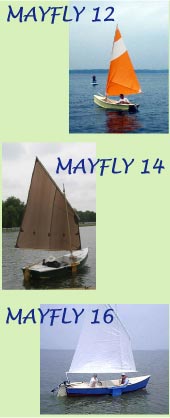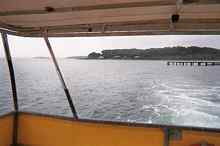
 Custom Search
|
|
| sails |
| plans |
| epoxy |
| rope/line |
| hardware |
| canoe/Kayak |
| sailmaking |
| materials |
| models |
| media |
| tools |
| gear |
 |
 |
| join |
| home |
| indexes |
| classifieds |
| calendar |
| archives |
| about |
| links |
| Join Duckworks Get free newsletter Comment on articles CLICK HERE |
|
|
| A Camping Trip to End All Camping Trips - Pt. 1 |
by Jeff Michals-Brown - Brockton, Massachusetts – USA |
|
"It is my sad duty to write down these unpleasant tales, but there is nothing stopping you from putting this book down at once and reading something happy, if you prefer that sort of thing." -A Series of Unfortunate Events: The Bad Beginning by Lemony Snicket It all began with a Boston Harbor Islands camping trip with my youngest son Stephen - our one-on-one adventure last year - when Stephen suggested we do such a trip again, only this time with his older brother Trevor. We left from the same ramp in Hingham that we'd used last year, but this time with a reservation for a camp site on the newly-opened Peddocks Island. Like Grape Island, where we'd stayed last year, and most of the other islands of the Boston Harbor Islands park system, Peddocks is a stone's throw from the mainland, has a reasonable anchorage, composting toilets, eager park rangers, and both regular ferries to Boston and inter-island taxis. Although the park information calls this "rustic camping," I think of it as luxurious. Peddocks Island lay only 4 or 5 miles from the ramp in Hingham, so this would hardly be an adventure. Of course, last year's trip had turned out to be more of an adventure than we'd bargained for: grounded on a falling tide on Georges Island, finally getting off at night only to discover the centerboard case was jammed with sand and gravel, sailing for our site on Grape Island until we couldn't point, then anchoring for the night; a morning visit to the nearby shore to get a rock big enough to hammer the centerboard loose, and finally arriving at Grape Island at check-in time - but a day late. For this year's trip the first sign of trouble was a forecast of rain. The NOAA forecast for Boston Harbor was characteristically brief: Winds of 5-10 miles per hour. Rain. I had reserved the campsite over a week in advance, not having learned that the BHI campsites are not as sought-after as, say, seats on a cross-country flight. Now we would pay for this. But how bad could it be? We had mild winds, roomy tents, lots of good food, and we all love to read. Surely we could do some nice hikes and visit other islands during the drier bits.
Here are some lessons learned, in roughly chronological order.
The boat securely anchored, all our stuff ashore, safe from the hordes of mosquitoes in our tents at the officially-sanctioned site, we ate a simple midnight supper as the first drops began to fall. We drifted off to sleep to the pitter-pat of rain drumming on the nylon. Yes, I said "drumming." Awake in the middle of the morning, we discovered that our tents weren't entirely waterproof - little puddles were dealt with using drinking cups and a washcloth. I went out in the light rain to put up the free- standing umbrella and folding chairs I'd cleverly stuffed in the cabin. If I arranged it right and the wind didn't shift, I could keep one chair mostly out of the rain and a second about half out of it. If I needed a good stretch, this would be the place. Breakfast was granola, oatmeal and coffee without sugar (forgotten on the boat). After eating, we went to check out another possible shelter: a little house built on the dock optimistically equipped with some dozen or so bench seats for tourists waiting for water taxi or ferry. It would be an adequate book nook, and came with a view of nearby Hull and the bay we'd sailed across yesterday.
Spying a schedule on the dock and feeling hopeful about the small drizzle falling, we decided to chance a tour of nearby George's Island, home to a historic Civil War-era fort cum military base cum prisoner-of-war camp, etc, etc. Stephen and I had gone last year and he had put it on this year's itinerary also, partly for Trevor's sake, and partly because he wanted to return with flashlights to explore the darker and scarier recesses of the big granite structure. Of course, we forgot the flashlights in the tents.
The (free!) water taxi brought us the mile or two through Hull Gut to George's Island, which strategically commands the only original deep-water entry into Boston Harbor. We wandered the well designed exhibits of the visitor's center, then ventured into the light rain to explore the fort itself. Funny story: the fort was originally built as part of a huge network of congressionally authorized coastal defenses designed to protect us from attack by ships-of-the-line that might mount a hundred or more guns throwing balls weighing upwards of forty-two pounds apiece. When it was completed in the 1850s, there was only enough money left for one gun. The design was all but obsolete even as it was being built: a memorial to the star-shaped French designs of Medieval days. Of course, it eventually mounted respectable batteries and was updated many times over the next century - always for the last war, of course playing a role in the Civil War as a training base for Union recruits and later a notably humane prisoner-of-war camp for Confederate soldiers. (Another story: the the camp commandant was so highly-regarded by the confederate soldiers imprisoned there, that when his son went off to war he carried with him a letter signed by many of them which desired that the son be well treated in the event of his capture.) Later the fort was ready for the Spanish-American War that fizzled suddenly after the Spanish fleet was destroyed, and became a base for remotely operated mines that protected Boston from submarine attack during the world wars. (With all the shipping that comes through Boston, the thought of Coast Guardsmen at the fort with their fingers on mine detonation buttons makes me shudder.) In the end, the fort never saw an attack. On this second day, we learned yet more lessons.
Back on Peddocks, we returned to our tents to discover they leaked a good deal more than we'd thought. I bailed over a gallon of water from the floor, one quart sauce pan at a time, as more rained down on me from the sides and roof. Eventually I discovered I could sort of squeegee the water out the door, saving the bailing for the puddles in corners and edges. Luckily I had brought a cushion from the boat that enabled me to sit without being in standing water. It was about this point, sitting on my cushion and wondering what to do next, that Trevor commented that it wouldn't be an adventure if we weren't cold and wet. Never mind that I maintain that hot and wet can be just as adventurous - my heart was warmed by his fortitude and good humor. As we laughed and joked about this, I reflected that at no time did either of my boys whine about the situation or ask to go home. I can think of no child of my acquaintance who would show such spirit, and I was immensely proud of both of them. With nothing to do but feel sorry for ourselves as we watched the tent walls shudder with the wind, showering us with rain, then occasionally collapse almost flat with gusts, I decided it must be time for a story. Fortunately I had thought ahead, choosing from the shelf on the way out a book I had never read: Peter Pan. It's well worth reading - especially the beginning, with its description of Mrs. Darling whose "romantic mind was like the tiny boxes, one within the other, that come from the puzzling East, however many you discover there is always one more; and her sweet mocking mouth had one kiss on it that Wendy could never get, though there it was, perfectly conspicuous in the righthand corner" and Mr Darling, who "was one of those deep ones who knew about stocks and shares. Of course no one really knows, but he seemed to know, and he often said stocks were up and shares were down in a way that would have made any woman respect him" and who "got all of her, except the innermost box and the kiss. He never knew about the box, and in time he gave up trying for the kiss." Over the flapping and clatter of wind and rain I read aloud, stopping only every other chapter to rest my voice and bail water. Interrupted only by a belated supper (the lighter refused to work for a while) and a visit from the rangers, I read 10 chapters before we tried to sleep. Both boys were quiet, but whenever I paused both insisted on hearing more. The rangers came to give us a positive weather report for the morrow - wind slackening to 5-10mph and less rain - and to suggest we move the tents into the shelter of nearby rose bushes, which I promptly did. This made a difference in that, instead of near-constant drizzle inside the tents, the gusts that reached us less frequently would cause little downpours of accumulated drops. To be continued... |
 |





